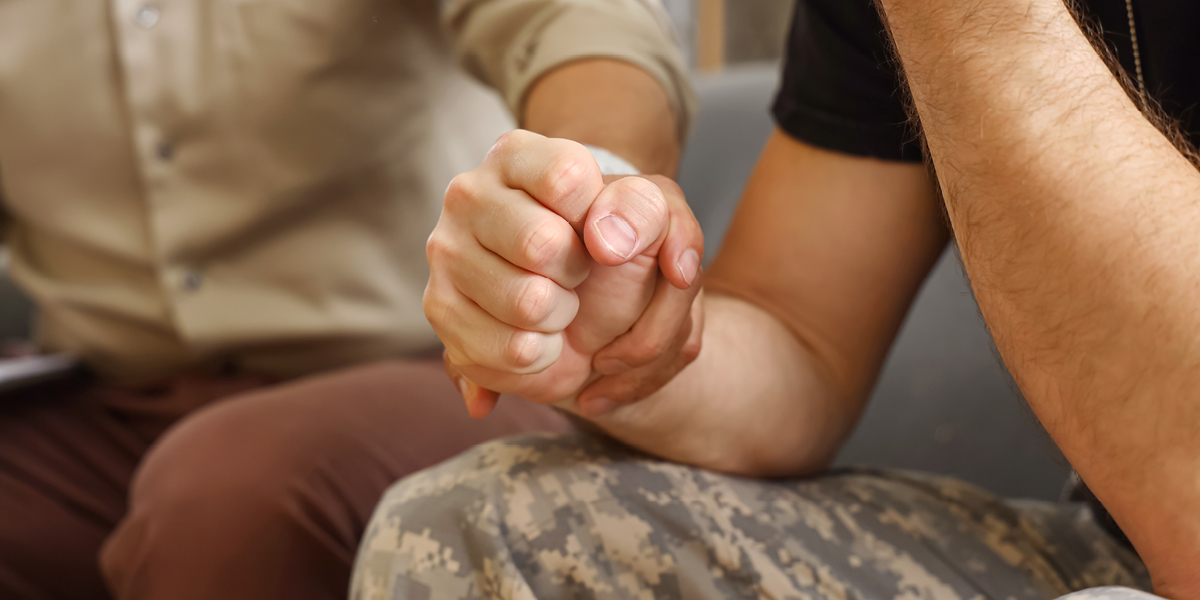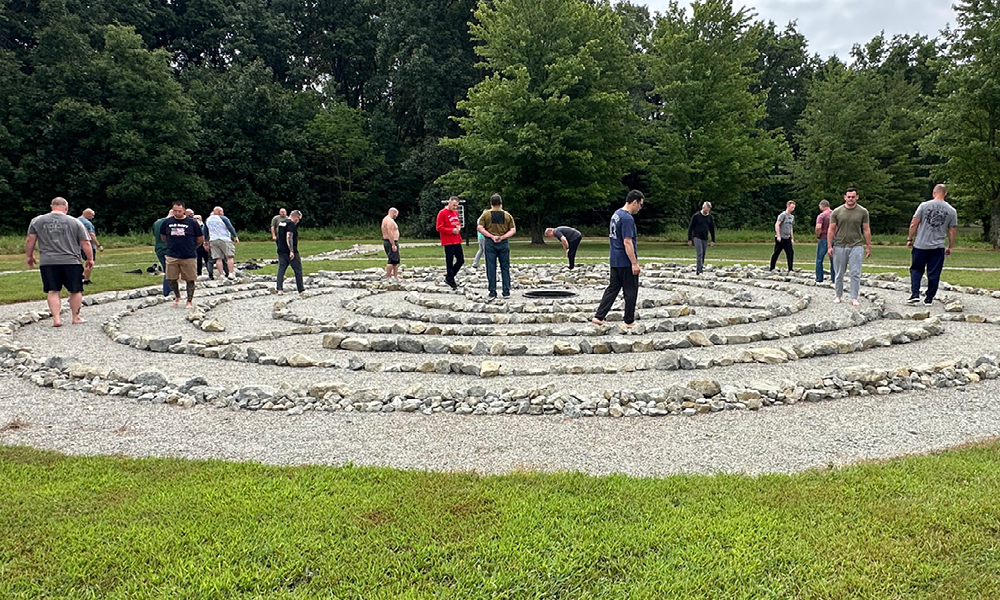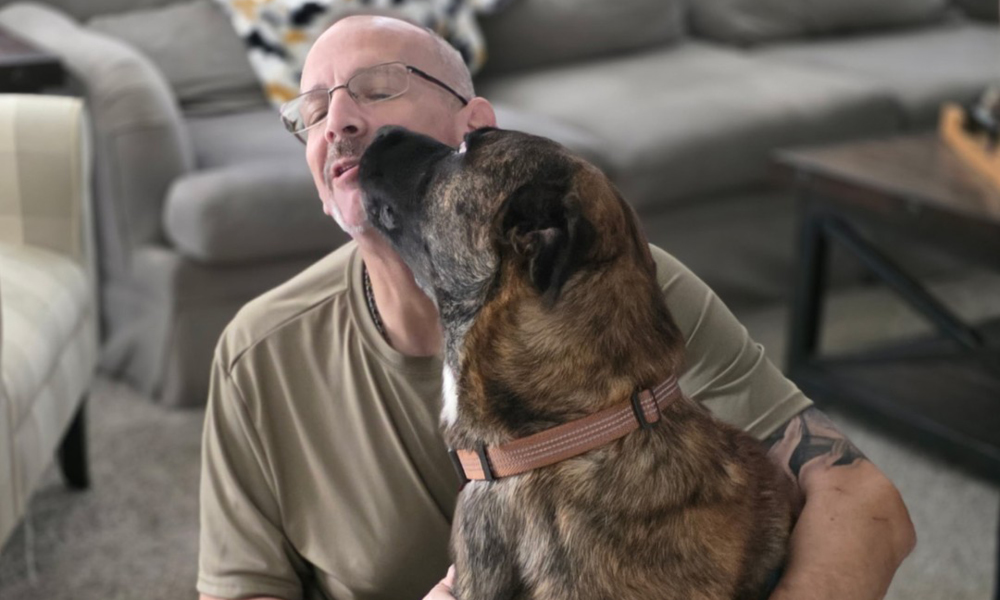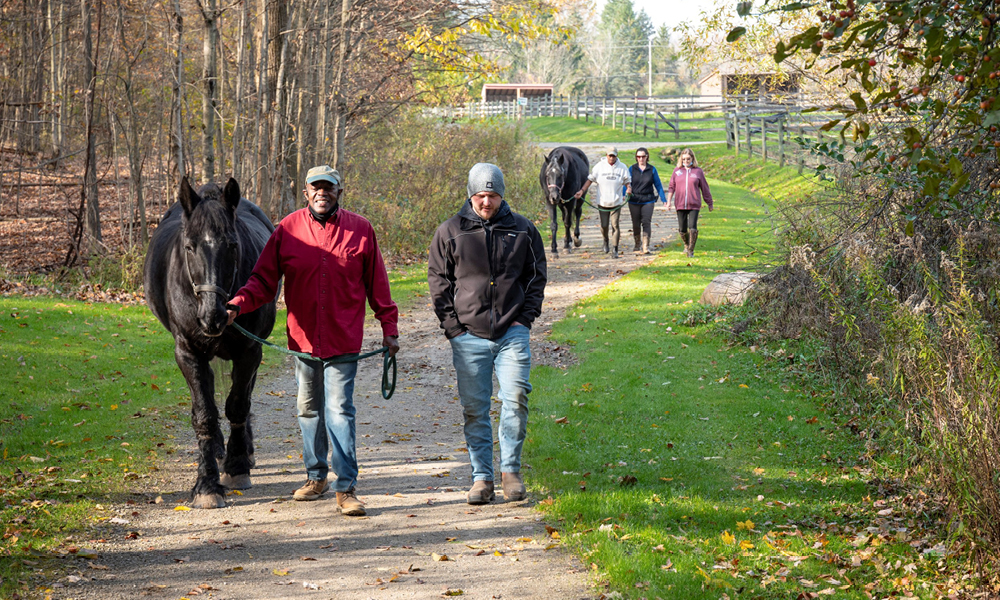Veterans Discover Paths to Healing
Former members of the U.S. Armed Forces have found services in Ohio that lead them beyond their traumas and help them reconnect to themselves and their communities.

Joe Robb said he had nothing else to lose when he decided to go through the Save a Warrior program. The U.S. Army veteran had returned home after being deployed in a combat role in Iraq for 15 months. He had experienced ongoing struggles with alcoholism and substance abuse, but got sober in 2017. Even so, he was still having daily suicidal thoughts and he planned to act on them.
In the midst of these hardships, he was taking courses toward a master’s degree in social work with a focus on veterans because he felt he had been unable to find the help he needed. At the suggestion of two professors, Robb attended a 2019 presentation by someone from Save a Warrior.
“I had never heard anyone speak the truth and have an understanding of what I was actually going through,” said Robb, who soon applied and was accepted to Save a Warrior’s program.
The Ohio-based organization serves veterans, active-duty servicemembers, and first responders who are having suicidal thoughts. Robb said he spent years in Alcoholics Anonymous programs, but they didn’t defeat his decades of self-hatred or his feelings that he didn’t deserve a decent, happy life. At Save a Warrior, though, he felt a level of safety to share experiences he had held back until then. That made the difference for him.
He shared that the people in his group at Save a Warrior didn’t weaponize what he had been withholding. Instead, they showed love, care, and acceptance.
“No one judges or shames you,” he explained. “They said, ‘Keep going. What else do you have?’”
Adam Carr, Save a Warrior’s executive vice president, noted that along with helping veterans broadly, the group has built relationships with a few Ohio courts to assist veterans who have ended up in the justice system. An email, call, or text connects a veteran who needs help to the group, he said. Ohio courts have paved the way for that connection through the nearly 30 veterans-centered specialized dockets that are certified by the Supreme Court of Ohio, he noted.
“Ohio’s courts have been deliberate in creating a true alternative path for veterans,” said Carr, who will be speaking at the Supreme Court’s Lean Forward Veterans Summit this month. “Ohio shows real leadership in ensuring veterans receive treatment, mentorship, and restoration instead of punishment.”
At Save a Warrior, they dive deep with the veterans who find or are referred to the group. Save a Warrior leaders understand that beneath the suicidal thoughts are people who are suffering because of traumatic experiences from childhood and military service. They also know the concerning numbers of veterans who die by suicide. The U.S. Department of Veterans Affairs reported in 2024 that 17 veterans die by suicide each day. Additional research from Operation Deep Dive shows 24 veteran suicides daily, as well as 20 more deaths a day of veterans that are categorized as accidental or undetermined – most of which are overdoses.
With an awareness of these distressing statistics, Save a Warrior staff will go anywhere in the state to talk about what the group offers for veterans having suicidal thoughts, said Robb, now the organization’s director of culture. For courts, the group has visited the veteran specialized dockets in Delaware and Montgomery counties a couple times each year. They talk to the specialized docket mentors to make them aware of the program for themselves or others, Robb said. They also speak directly to veterans participating in the specialized docket.
“We make it clear that we’re not a get-out-of-jail-free card,” he said. “We are all about the veterans taking responsibility for themselves.”

At Save a Warrior, veterans walk the labyrinth, reflecting on their journey to that point and preparing to leave their metaphorical armor in the center.
Sobriety and Readiness To Do the Work Are Needed
At the core of the Save a Warrior program is an intensive 72-hour experience over a long weekend. However, before veterans can participate in the core program, they first need to have 30 days of sobriety from any drug or alcohol issues. If they are willing to work toward sobriety, they won’t be left behind. Robb helped to make that philosophy a reality by setting up separate services for veterans seeking sobriety. Today, Save a Warrior holds three meetings a week for veterans based on the 12-step model of Alcoholics Anonymous. Veterans are linked not only to meetings but also to other veterans involved with Save a Warrior who can be their sponsors.
After achieving sobriety for 30 days, veterans can meet with staff to see if they are a good match for the core program, which is free. Carr said they have one central requirement: “The veteran must be ready to be done suffering.”
He said if they are open to changing how they’ve been approaching life, willing to listen, and ready to do the work, they go through a process during the three-day weekend. The process shifts the mindset that is keeping them stuck in situations that are destructive, he explained. Veterans are also guided on how to integrate positive survival traits, including meditation, into their lives.
Carr said the group emphasizes accountability, in part through pairing up veterans and encouraging them to tell on themselves when they slip or make mistakes – minus any shame or judgment. They walk out with a 500-day plan to keep moving forward.
“Over 72 hours, they rediscover meaning, reconnect with their hearts, and begin to see life not as something to endure, but as something sacred to live fully,” he said.
In 2024, Save a Warrior had 376 people complete the program. Carr points out that the impact of saving a person’s life reaches far beyond that individual. When one person dies by suicide, 135 others – from emergency personnel to close family and friends – are affected, according to research from the University of Kentucky.
“Imagine what preventing suicides does generationally,” he said. “You’re healing forward generations.”
At the Delaware Municipal Court, Adam Garloch said he has seen Save a Warrior help veteran participants as well as mentors for the specialized docket. He coordinates the court’s veterans specialized docket, known as Mission Court.
“It gets veterans out of court and around others with similar lived experiences,” Garloch said. “It also gives them resources and an additional support network that they can turn to if they are having a hard time.”
For one veteran who faced a domestic violence charge, Save a Warrior made a dramatic difference, Garloch noted.
“It seems to have changed his mindset completely,” he said. “It also helped him reevaluate his relationships with others and how to address underlying trauma and issues as they appear.”
Carr has observed this type of radical change over and over.
“It’s really challenging to truly transform,” he said. “But we have people who were homeless and now make seven figures. And others who couldn’t read, who are now working on their PhDs.”
Comfort and Stability Found Through Caring for Dogs
When Joshua Doran returned from military service in Afghanistan, he found another avenue that also gave him connection, stability, and healing. Doran said he was trying to transition back to civilian life and was in a dark place, feeling disconnected, isolated, and without a focus. The help he needed came in the form of a “small fluff ball dog” named Skrappy.

Being matched with a dog through Veteran Companion Animal Services gives veterans not only wet dog kisses, but also structure, accountability, and purpose.
For veterans dealing with post-traumatic stress disorder, anxiety, depression, or isolation, the companionship of an animal can bring comfort, stability, and a renewed sense of purpose, said Doran, who is CEO of the Veteran Companion Animal Services (VCAS) and will be a presenter at the Lean Forward Veterans Summit.
“Veterans sacrifice so much in service to our nation, and too many face these invisible wounds after returning home,” he said. “At VCAS, we believe no veteran should walk that journey alone.”
As one of its services, VCAS pairs veterans with dogs that are rescued and in need of homes. The program is available to any veteran, but VCAS also receives referrals through justice-related programs and Veterans Administration caseworkers, and has partnered with the veterans specialized docket in the Delaware Municipal Court.
“When veterans are referred through the court system, participation in VCAS can complement their recovery and rehabilitation plans,” Doran said. “Our programs provide structure, accountability, and purpose – core values that align closely with what specialized dockets for veterans aim to foster.”
The VCAS rescue dog placement program unlocks opportunities to bond with a pet for veterans who wouldn’t qualify for a service dog, which requires a medical diagnosis, Doran said. He explains that many veterans with mental health issues don’t seek an official diagnosis, sometimes because the process is complex, other times because of associated stigmas. But VCAS is able to fill this gap, providing the “healing companionship” of a dog without the barriers, he said.
For the first year a dog is placed with the veteran, VCAS covers all costs for food, supplies, and veterinary care. Doran said veterans regain a sense of responsibility, and often describe their dog as the “battle buddy” who helps them rediscover focus and balance.
“These dogs provide more than comfort,” he noted. “They help veterans rebuild trust, reconnect with family and community, and find hope in everyday moments.”
Doran has experienced it firsthand.
“Skrappy became the lifeline I needed,” he said. “He pulled me back from the edge during some of my toughest days. He gave me structure, unconditional love, and a reason to get up in the morning. Through Skrappy, I began to find my footing again.”
Horses Steer Participants to Calm, Reasoned Thinking
Animals seem to lift veterans out of the stressed and vigilant states where many are mired. Valorie Machovina of Fieldstone Farm noted that veterans, and others, who have experienced traumatic events are often stuck in one gear – survival. Machovina is the equine director at the Chagrin Falls therapeutic equine center, which traverses 45 acres of rolling pastures, is home to 30 horses, and offers programs for veterans. She said that forming a bond with a horse helps to break free of that heightened state of overdrive.
Machovina, who will also speak at the Lean Forward Veterans Summit, explained that each veteran visiting Fieldstone chooses a horse and builds a relationship by focusing on body language – their own as well as the horse’s. Veterans begin to notice how the horses react to them, and how they might need to alter their behavior to partner with the horses while grooming, walking, or riding them, or driving a carriage pulled by the horses.

By bonding with horses, veterans at Fieldstone Farm have freed themselves of feeling stuck in the constant state of survival associated with combat deployments.
She noted that because horses view humans as predators, they experience fight, flight, or freeze responses around people. To trust a human, a horse must sense that the person is safe and “congruent,” meaning the person’s inner thinking and outer behaviors are aligned, she said.
As veterans learn to groom, walk, ride, or drive the horses, she said the focus stays on the horse – What does the horse need? By helping the horses regulate their fight, flight, or freeze responses, veterans begin to intuitively experience being able to manage their own emotions and thoughts, she said.
“Through building the relationship and integrating rhythm and movement while with the horse, they get out of the fight-flight-freeze responses, and build new pathways in their brains,” said Machovina.
She said they stop responding instinctually and move into higher-level reasoning and are able to make better decisions.
Fieldstone hosts veterans groups from the VA each week. And Machovina said the farm is talking with judges in Geauga and Portage counties about how Fieldstone programs, which are free, might also serve veterans involved in those courts.
One distinctive service for veterans – carriage driving – accommodates individuals with restricted mobility. Each carriage, pulled by a horse, is wheelchair accessible. In learning to drive a carriage, a veteran relies on their voice and the reins to communicate with the horse, Machovina explained.
“The sense of freedom they find with a carriage changes veterans,” Machovina said. “Sitting in the carriage about 5 feet off the ground and guiding the horse around the arena can be empowering.”
Horses also naturally push visitors at Fieldstone to become fully present and live “in the moment,” she said. That mindfulness helps veterans overcome anxiety, regulate emotions, feel understood, and find possibilities for learning.
“I often hear how our horses have changed the lives of our veterans as they find a place of support, full of empathy and free of judgment,” she said.
Benefits of Healing Extend From Veterans to Many Others
Many veterans who have benefited from these programs have become full-time employees or volunteers with the organization that helped them, and maybe even saved their lives. Serving others is central to successful recovery at organizations like Save a Warrior, said Carr. It’s not just about helping yourself, it’s about coming back and assisting others through the steps, he explained.
He sees veterans who start the long weekend guarded, shaking, and biting their nails. And through the process, a “life force” is created, and they start to “emanate joy,” he said.
“The transformation is contagious,” Carr said. “When one warrior heals, it radiates outward – to their families, their children, their communities.”
Those who have served the country deserve nothing less.
CREDITS:
Design: Ely Margolis
Web: Erika Lemke
